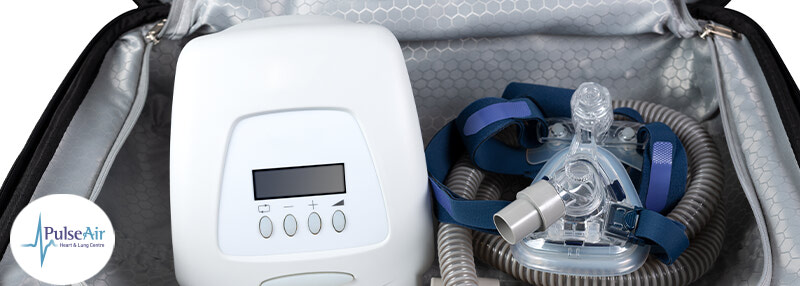Are you ready to explore the world or gearing up for holiday travel, but worried about traveling with sleep apnea? Don't let your condition hold you back from experiencing new cultures and making unforgettable memories. At Pulse Air Heart and Lung Centre, we want to help you travel safely and comfortably with sleep apnea. Here are X tips to get you started:
1. Consult Your Doctor
Before planning your trip, consult with your doctor to discuss any concerns or precautions you should take while traveling with sleep apnea. They may recommend adjustments to your treatment plan or provide additional guidance on managing your condition while away.
2. Pack Your CPAP Machine
If you use a Continuous Positive Airway Pressure (CPAP) machine, be sure to pack it in your carry-on luggage. This will ensure that you have it with you at all times, and it won't get lost or damaged during transit.
3. Bring a Travel-Sized CPAP Machine
Consider investing in a travel-sized CPAP machine that is specifically designed for travel. These machines are often smaller, lighter, and more portable than traditional CPAP machines.
4. Research Your Destination
Research your destination to ensure that you'll have access to power outlets and a comfortable place to sleep. You may also want to consider booking a hotel room with a humidifier, as dry air can exacerbate sleep apnea symptoms.
5. Stay Healthy
Staying hydrated is crucial when traveling, especially with sleep apnea. Drink plenty of water throughout your trip to help keep your airways moist and prevent dryness. Pay attention to any changes in your symptoms while traveling. If you notice any issues, don't hesitate to seek medical advice.
6. Avoid Sleep Deprivation
Try to maintain your regular sleep schedule as much as possible while traveling. Avoid sleep deprivation, as it can exacerbate sleep apnea symptoms and make it harder to manage your condition.
7. Bring a Sleep Apnea Travel Kit
Pack a sleep apnea travel kit with essentials like a mask, hose, and filter. This will ensure that you have everything you need to manage your condition while away including back up supplies.
8. Prepare for Different Time Zones
If you're traveling across time zones, gradually adjust your sleep schedule a few days before your trip. This can help minimize the effects of jet lag and make it easier to stick to your CPAP routine. Once you arrive at your destination, set your CPAP machine to the local time to help your body adjust more quickly.
9. Consider Travel Insurance
Consider purchasing travel insurance that covers sleep apnea-related medical expenses. This can provide peace of mind and financial protection in case of an emergency.
10. Be Prepared for Altitude Changes
If you're traveling to a high-altitude destination, be prepared for potential changes in your sleep apnea symptoms. Altitude can exacerbate sleep apnea, so be sure to monitor your symptoms and adjust your treatment plan as needed.
11. Stay Connected with Your Healthcare Team
Stay connected with your healthcare team while traveling by keeping them informed of your itinerary and any changes to your treatment plan. This will ensure that you receive the support and guidance you need while away.
Stay safe and healthy on your travels!
By following these tips, you can travel safely and comfortably with sleep apnea. Remember to always prioritize your health and take necessary precautions to manage your condition while away. Happy travels!
If you believe you are experiencing sleep apnea symptoms or other respiratory symptoms, consult with your healthcare team. Check out all the services we offer at Pulse Air for your health and wellness!


